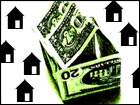
NEW YORK (CNN/Money) -
A sharp sustained decline in housing prices is possible but not likely in the United States, according to a study conducted by a group at Harvard University and released Tuesday.
The annual "State of the Nation's Housing" study, compiled by the Joint Center for Housing Studies at Harvard, forecasts that the number of households in the United States will rise 22.6 percent to 129 million over the next 20 years, suggesting a continued rise in demand as well as prices.
"While the housing market may cool in the near term, favorable demographics should prevent a deep chill," the report concluded.
The prediction breaks down to growth of about 1.19 million households a year, down slightly from the 1.26 million average annual growth rate in the 1990s.
Some economists say that the slight slowdown in household growth could dampen price increases, especially as Baby Boomers age and settle in their homes. But that hasn't been the case so far as the post-war generation keeps trading up to more expensive homes and buying second homes for vacations, according to the study.
Additionally, a surge of immigrants swelling the ranks of first-time buyers as well as low mortgage rates and other alternative financing plans for lower-income families have helped fuel the housing boom, and the study suggests these trends will continue and lead to greater home-price growth.
But a few factors could buck those trends, including a possible increase in the purchase of manufactured homes, issues of affordability and a possible increase in mortgage rates, as well as questions of whether strength in immigration will continue.
Experts expect immigration to rise by 15.3 million over the next two decades, contributing to 64 percent of the new household growth, but potentially tougher laws could affect this number.
The starts of single-family homes totaled 1.27 million in 2001, the largest number since 1978 when the Baby Boomers led it to 1.4 million. Overall, the monthly after-tax cost for buyers purchasing a typical home fell $22 to $821, the study found.
Separately, the Wall Street Journal reported Tuesday that state and local governments are taking advantage of the surging housing market to increase real-estate tax assessments, meaning higher property taxes for millions of Americans.
The U.S. Census Bureau said state and local governments took in $261.3 billion in property taxes last year, up from $244.7 billion in 2000 -- the highest level in a decade, and some consumers are fighting back, the report said.

|

